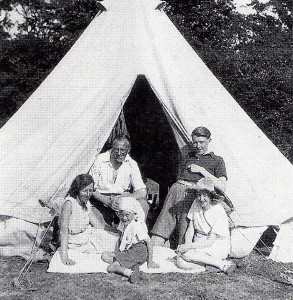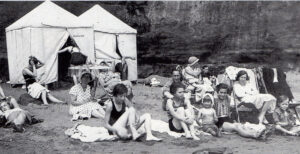
Since around the beginning of the 18th Century affluent members of society have been able to indulge in holiday breaks involving travel, but we ordinary folk had to wait considerably longer for travel to become either available or affordable.
I count myself fortunate in having been able to indulge from the late 1920s up to the outbreak of the Second World War. My holidays might have been on a fairly primitive level, but they were really enjoyable nevertheless.
At our Methodist church in Plumstead, South-East London, we got to know of a camping club set up by a nearby sister church, and it wasn’t long before some of us youngsters were invited to join.
In those early days the holidaymakers were almost all children or teenagers, but during the 1930s the inclusion of family tents was adopted, after which my mother would often take my two younger siblings. Dad went only once, but then he usually volunteered to supervise school journeys, and never seemed keen on the idea of family holidays anyway.
My first experience of the Invicta Camping club was when the chosen site was Pagham, just outside Bognor Regis. This resort had just earned the royal title after King George V had recuperated there after a serious illness.
Probably aged 13 at the time, and despite prevailing unsettled weather, I thoroughly enjoyed being able to holiday with so many young people. Our homes for the fortnightly summer breaks were ex-army bell tents -comfortable enough under most conditions, although it paid to be able to select a really sound one.
Unlike modern tented homes, any facilities consisted of whatever we could provide that would fit into our very limited space. The only provided extra was a straw-stuffed palliasse. An advance party would travel down on the Friday afternoon to set up tents and fill the palliasses, etc; and a large marquee housing a ‘honky-tonk’ piano would be erected by professionals.
After the inclusion of family camping, and when our church had become more fully integrated, the catering was taken over by a volunteer couple from our church who did a marvellous job with the very limited funds available, the usual charge for the two-week holiday not exceeding £2 at the time.

Our very able pair generously augmented the kitty by adding their Co-op dividend for their own purchases during the year, and I well recall how the menus satisfied even the voracious appetites of myself and friends.
The appetising smell of good bacon being cooked over an open fire was usually enough to ensure prompt attendance at breakfast even by the laziest members, who would otherwise be suffering by lunch time. Bread and butter with marmalade taken from 71b. stone jars completed the meal, for which unlimited tea would be available from a huge urn.
The camp’s only paid member, who was keen enough to work very hard for his pittance, was known as Old Cookie. Of indeterminate age but definitely elderly, he cheerfully supervised cooking during the whole two weeks, usually being pressed to take a solitary half day out of camp.
Our own fatigues would be limited to an hour or so each week, with perhaps an occasional forage for firewood. In-camp entertainment would be laid on at least once a week to include all local talent. For some of that we knew we could rely on Old Cookie, who would have regaled us for far too long, given full rein. His star piece song bore the title She ‘It Me Wiv a Poker, a gory little number providing an insight into domestic disharmony during the late Victorian period.
In later years, when our camping sites included Somerset, Devon and Dorset, our style became rather more sophisticated when a number of us were able to take our own cars. On my earliest venture I remember a spirited discussion as to whether the old motor coach would manage to reach the summit of Berry Hill before running down towards Bognor.
Other locations for which attractive and convenient sites had been found were Weymouth, Exmouth and Weston-super-Mare.
Inevitably, juvenile romances were set up, but for my own part in those days I was content to enjoy the romance of the English countryside and seaside.
Two scenes which have remained vividly in my memory were viewing Corfe Castle by the light of a full moon on a wonderful summer night, and taking in the grandeur of Fingle Bridge in Dartmoor. The latter is part of the Upper Teign gorge as the wild river flows rapidly towards the sea on the South Devon coast.
Without the discovery of the Invicta Camping club, my early life would have been very much poorer.
D. A. Bishop.








